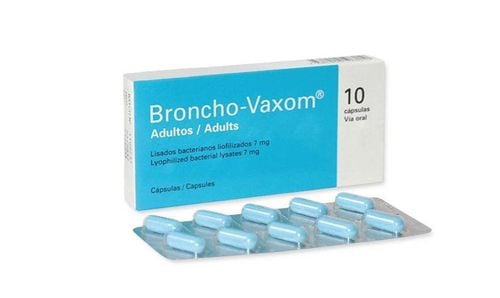This is an automatically translated article.
Children's resistance is the body's protective barrier against harmful invaders, helping them stay healthy, develop well and avoid frequent illnesses. Therefore, increasing the baby's resistance will help them eat better and absorb nutrients better, stay healthy and grow fast every day.
1. What is resistance?
Resistance is the ability to defend and fight against harmful agents entering the body to cause diseases. Invasive agents can be bacteria, viruses, fungi, parasites, dust or chemicals from the surrounding environment, from daily food and drink.
When in the womb, the baby already has a certain resistance to help fight harmful agents. However, because the resistance of young children has not yet fully developed, when they are born, they have to be exposed to a new living environment, so they are very susceptible to diseases, especially respiratory and digestive diseases.
In the first 6 months after birth, the child's resistance depends entirely on antibodies from the mother passed through the placenta and breast milk. This is called passive immunity.
Children start weaning from 6 months of age, when exposure to food and antigens means an increased risk of exposure to pathogens while the child's ability to protect themselves is still weak.
Besides, starting from 6 months onwards, the source of antibodies transmitted from the mother is gradually depleted, the child must increase resistance by creating their own antibodies. During the first year, the immune system of a child is just beginning to form and it is not until the age of 3 or 4 that the immune system gradually matures.
2. The role of increasing the baby's resistance
A good child's resistance will be an immune barrier to protect the body against diseases, help children stay healthy and develop well. If the child's resistance is weak, it will be a favorable condition, causing the child to often fall ill because the child's immune system is still incomplete and the natural protective barrier is reduced.
Children often have respiratory diseases such as: allergies, flu, nasopharyngitis, bronchitis, pneumonia, and digestive tract disorders such as constipation, diarrhea, and raw feces. In addition, the use of antibiotics to treat children's diseases can also cause children to have digestive disorders, constipation, diarrhea due to intestinal bacterial disorders, leading to poor nutrient absorption and aggravated diarrhea. nutritional status of children.
Malnourished children have weakened immune systems, making them more susceptible to diseases, making them more and more anorexic, creating a difficult pathological spiral. This affects the comprehensive development of both physical and mental health of children, leading to malnutrition and rickets. Therefore, increasing the baby's resistance is an essential job to have a good immune system, creating favorable conditions for the baby to develop in the best way, minimizing disease.

Tăng sức đề kháng cho bé là một việc làm thiết yếu để bé có hệ miễn dịch tốt chống lại bệnh tật
3. How to strengthen your baby's resistance
Increasing the baby's resistance is a coordinated process of many measures. Parents should apply the integration of the following methods to help children's resistance become better and better, and reduce children's frequent illnesses.
3.1 Keep the environment clean A clean living environment can eliminate pathogens. The way to create a clean living environment to increase the baby's resistance is:
The place must be airy and clean, so open the window during the day to catch the warm sun, wind and fresh air. Pathogens also escape from the habitat. Absolutely do not smoke in the house to avoid the risk of children being exposed to secondhand smoke, which will harm the child's resistance. Give children the habit of keeping their body clean, brushing their teeth clean, bathing regularly, to eliminate the agents that make children susceptible to diseases, and to prevent infections caused by bacteria and viruses. 3.2 Complete and balanced nutrition For infants
Colostrum is the best source of nutrition for infants. Colostrum is secreted by the mother from the first hours, especially in the first 3 days after birth. Colostrum has a yellow color compared with very high protein content, contains abundant sources of antibodies such as IgA, IgE, IgM, lysozyme pigment and Lactoferrin... All these antibody factors help enhance immunity. , help children can avoid many diseases. At the same time, colostrum contains up to 26 types of amino acids and many minerals, so it works very well to increase the baby's resistance. Many studies have proven that breastfeeding babies can prevent allergies and diseases, protect babies from harmful viruses and bacteria, support the immune system of babies... Nutrients found in breast milk can protect babies against infections and improve immunity for babies. Exclusive breastfeeding for the first 6 months after birth and if possible, extend to 24 months to help increase the baby's resistance in the best way. For older children
Give children enough water to eat enough to ensure 4 food groups are protein, starch, fat and fiber. Young children are in the development stage, they need to increase their protein intake because protein provides essential amino acids, which are raw materials for the body to produce components of the immune system such as white blood cells and lymphocytes. Protein is found in meat, fish, eggs, and milk. Children under 1 year old need 100 to 150g of meat and fish per day, children from 1 to 3 years old need 150 to 200g of meat and fish per day. Powdered sugar is mainly found in rice, corn, noodles, and tapioca. Fats come from vegetable oils and animal fats. Fiber is found in fruits and vegetables. Food should be processed in a soft, tender form for easy digestion, with little seasoning. Increase the addition of zinc-rich foods that are good for the digestive system, help children eat better and absorb better such as cereals, beef, shrimp, crab, animal liver. Supplementing with vitamins C, E, which are found in many fruits, vegetables and fruits such as grapefruit, oranges, and lemons, helps children strengthen the immune system, laxative, and avoid constipation. If the child cannot eat pieces, the fruit can be ground into fruit juice for the child to drink. Yogurt, legumes and whole grains also help increase your baby's resistance. Immune alpha supplements: Immune alpha extracted from yeast cell walls has been shown to strengthen the body's resistance through many mechanisms. Immune alpha increases IgA antibodies in the salivary glands, increases bactericidal polymorphonuclear white blood cells and increases the activity of cytokine components thereby enhancing immunity. Immune alpha can help relieve symptoms of upper respiratory tract infections in adults, the elderly, pregnant women, and especially children. Supplementing with probiotics: Young children often have digestive disorders, constipation, diarrhea, and raw stool. This leads to the inability to absorb nutrients even if the child eats them. Immune cells located in the digestive tract make up 80% of the body's total immune cells. The mesenteric lymph nodes in the gastrointestinal tract are the main production sites for immune cells, creating antibodies to help strengthen the child's resistance. Therefore, it is important to supplement probiotics to help children's digestive system be healthy, enhance absorption of nutrients, especially calcium, to help prevent rickets, develop physical strength and better weight. Because probiotics contain live bacteria, they only work if there's enough left over by the time your child takes it to the intestines. Therefore, probiotics should be selected that meet the following criteria: contain both probiotics (beneficial bacteria) and prebiotics (soluble fiber); Formulated with Duolac TM double-coated technology to help protect beneficial bacteria from the destruction of gastric juice, bile and is derived from nature, safe for long-term use.

Bú sữa mẹ hoàn toàn sau sinh giúp tăng sức đề kháng cho bé một cách tốt nhất.
3.3 Exercise regularly and get enough sleep Regularly for children to be active, do sports to help increase their resistance. Sports such as cycling, swimming, soccer are not only effective in enhancing natural antibodies, absorbing vitamin D, but also helping children eat more, more appetizing, helping children to be active and active. Be creative. Children need to practice a healthy lifestyle, put them to bed early, and ensure enough sleep. Because sleep is of great importance in improving and strengthening children's resistance. Lack of sleep makes children more susceptible to diseases due to a decrease in natural immune cells and makes children uncomfortable, mentally unstable, and less receptive.
3.4 Vaccination Vaccinations – Vaccines can provide antibodies or stimulate the body to make antibodies, thereby conferring immunity to pathogens. Vaccinating fully and on schedule is a scientific and effective measure to help increase the baby's resistance. In short, children often fall ill, are prone to respiratory and gastrointestinal diseases are manifestations of disease. Children's immune system is weak. Therefore, parents need to increase their child's resistance, through a reasonable daily diet, a healthy lifestyle and full vaccinations.
The first years of life are extremely important for a child's development. This period, if not taken care of carefully, will affect the current health but also affect the long-term development. Especially for children with nutritional problems (rickets, malnutrition) or children with immune systems (easy to get sick, slow to grow).
For children to be healthy and develop well, it is necessary to have a nutritious diet in terms of quantity and quality balance. If children are not provided with adequate and balanced nutrients, it will lead to diseases of excess or lack of nutrients, which adversely affect the comprehensive development of children in terms of physical, mental and motor skills.
Children who do not eat properly are at risk of micro-mineral deficiency causing anorexia, growth retardation, malabsorption,... If they notice the above signs, parents should supplement their children with products. The supplement contains lysine, essential micro-minerals and vitamins such as zinc, chromium, selenium, and B vitamins to help fully meet the nutritional needs of children. At the same time, these essential vitamins also support digestion, enhance nutrient absorption, help improve anorexia, and help children eat well.
Parents can learn more:
Signs of zinc deficiency in children
Micronutrient deficiency and failure to gain weight in children
Please regularly visit Vinmec.com website and update useful information to take care of your child. Take care of the baby and the whole family.













